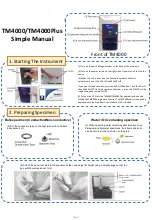
19
As the performance of microscope can’t play fully due to unfamiliar operations, the table below
can provide some solutions.
Problem
Cause
Solution
1. Optical Part
(1) The LED light
is bright, but it’s
dark in the field of
view.
Field diaphragm is not large
enough.
Enlarge the field diaphragm.
Condenser is too low.
Adjust the condenser.
Condenser centered incorrectly.
Center the condenser.
Condenser installed incorrectly,
the fixed screw is not in the
groove of bracket.
Install it correctly.
(2) The side of the
field of view is dark
or not even.
The nosepiece is not in the right
position.
Turn the nosepiece into the right
position.
Stain or dust has accumulated on
the lens such as condenser,
objective, or eyepiece.
Clean the lens.
(3) Stain or dust is
observed
in
the
field of view.
Stains have accumulated on the
specimen.
Clean the specimen.
Stains have accumulated on the
lens.
Clean the lens.
(4) Unclear image
The cover glass is not standard.
Use a standard cover glass with
thickness 0 or 0.17mm.
The cover glass faces down.
Adjust it.
The
immersion
oil
has
accumulated
on
the
dry
objective.
Clean it thoroughly.
The immersion oil is not used for
oil objective.
Use immersion oil.
Air bubble is in the immersion.
Get rid of the air bubble.
Use wrong immersion oil.
Use a correct one.
The aperture diaphragm is not
opened correctly.
Adjust the aperture diaphragm.
Stain or dust has accumulated on
the inlet lens of eyepiece.
Clean the lens.
The condenser is too low.
Adjust the condenser to the
highest position.
(5) One side of the
field of view is dark
or the image moves
while focusing.
The nosepiece is not in the right
position.
Turn the nosepiece into the right
position.
Condenser centered incorrectly.
Center the condenser.
Condenser installed incorrectly,
the fixed screw is not in the
groove of bracket.
Install it correctly.
5. Troubleshooting
Series



































